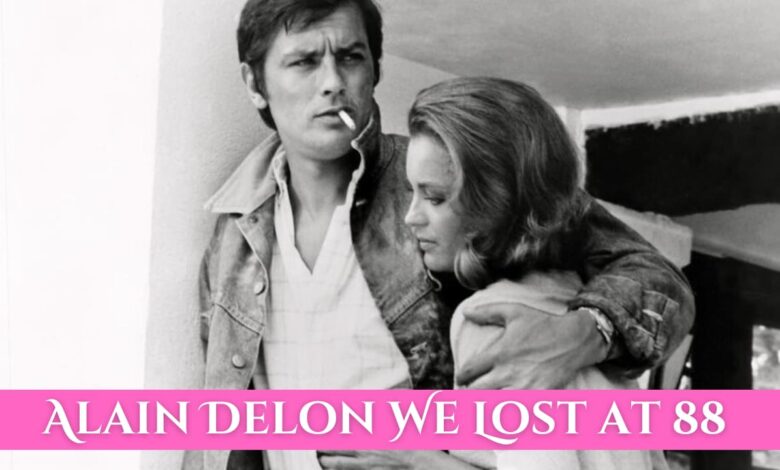Alain Delon: We Lost at 88

The world mourns the loss of one of its most cherished cinematic icons, Alain Delon, who passed away at the age of 88. As we reflect on his illustrious career, it becomes evident that Delon was not merely an actor; he was a symbol of French elegance, a monument to the Golden Age of cinema, and a figure whose influence transcended generations.
A Star is Born: The Early Life of Alain Delon
Born on November 8, 1935, in Sceaux, France, Alain Delon’s early life was marked by both promise and hardship. His parents, Edith Arnold and Fabien Delon, divorced when he was just four years old, leading to a childhood of instability. Despite these early challenges, Delon’s magnetic charm and striking looks quickly set him apart.
His foray into the world of cinema began almost serendipitously. After a brief stint in the military, where he served in the First Indochina War, Delon returned to France with no clear direction. It was his undeniable charisma that caught the eye of talent scouts, and soon, the young man with piercing blue eyes was thrust into the limelight.
The Rise to Stardom: Delon’s Golden Era
The late 1950s and 1960s marked the golden era of Alain Delon’s career. His breakout role came in “Plein Soleil” (1960), directed by René Clément. In this adaptation of Patricia Highsmith’s novel, “The Talented Mr. Ripley,” Delon played the role of Tom Ripley, a character that showcased his ability to portray complex, morally ambiguous figures. The film not only catapulted Delon to international fame but also cemented his reputation as a leading man of French cinema.
Following this success, Delon starred in a series of films that are now considered classics. “L’Eclisse” (1962), directed by Michelangelo Antonioni, and “Le Samouraï” (1967), directed by Jean-Pierre Melville, are just a few examples of his work during this period. In “Le Samouraï,” Delon delivered a performance that is often hailed as the epitome of cool, portraying a hitman with a strict code of honor. His collaboration with Melville would continue in “Le Cercle Rouge” (1970), further solidifying his status as a cinematic legend.
A Global Icon: Delon’s Influence Beyond France
While Delon was a towering figure in French cinema, his influence extended far beyond the borders of France. He became an international star, working with renowned directors from around the world. His performances in films such as “The Leopard” (1963), directed by Luchino Visconti, where he played alongside Burt Lancaster and Claudia Cardinale, showcased his versatility as an actor. The film, which won the Palme d’Or at the Cannes Film Festival, remains a landmark in cinematic history.
Delon’s appeal was not limited to his acting prowess. He became a fashion icon, known for his impeccable style both on and off the screen. His portrayal of suave, sophisticated characters made him a trendsetter, influencing men’s fashion for decades.
The Later Years: A Continued Legacy
Even as he aged, Alain Delon remained a force in the film industry. He transitioned into roles that reflected his maturity, bringing depth and gravitas to his performances. In “Notre Histoire” (1984), directed by Bertrand Blier, Delon played a disillusioned man seeking meaning in his life, a role that earned him the César Award for Best Actor, France’s most prestigious acting honor.
Delon’s later years also saw him take on fewer roles, choosing instead to focus on his personal life and business ventures. He launched a successful line of perfumes and watches, further cementing his status as a cultural icon.
Alain Delon: The Man Behind the Screen
Beyond his public persona, Alain Delon was a man of many contradictions. Known for his intense privacy, Delon rarely gave interviews and guarded his personal life closely. However, he was also known for his outspoken views, often courting controversy with his opinions on various social and political issues.
Delon’s relationships were often the subject of media scrutiny. His romance with actress Romy Schneider, with whom he starred in “La Piscine” (1969), was one of the most talked-about love stories in European cinema. Their on-screen chemistry was undeniable, and their off-screen relationship, though tumultuous, remains a significant chapter in both their lives.
The Final Act: Remembering Alain Delon
Alain Delon’s passing marks the end of an era in cinema. He was not just an actor; he was a symbol of a bygone age, a time when cinema was a grand, transformative experience. Delon’s contribution to film, fashion, and culture is immeasurable, and his legacy will continue to inspire future generations.
As we bid farewell to this cinematic giant, we are reminded of the indelible mark he has left on the world. His films will continue to be celebrated, his style emulated, and his life remembered as one of the great stories of the 20th and 21st centuries.




